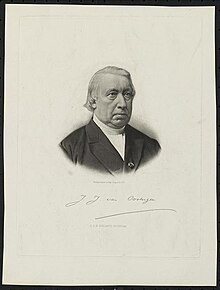Johannes Jacobus van Oosterzee
| Jan Jacob van Oosterzee | |
|---|---|
 |
|
| Born |
April 1, 1817 Rotterdam |
| Died | July 29, 1882 (aged 65) |
| Nationality | Dutch |
| Alma mater | University of Utrecht |
| Occupation | Pastor Professor of Theology |
| Known for | Collected sermons |
Jan Jacob van Oosterzee (April 1, 1817 – July 29, 1882), Dutch divine, was born at Rotterdam. He was educated at the University of Utrecht 1835 – 1839. He was also known as Jan Jakob van Oosterzee, JJ van Oosterzee, or Johannes Jacobus van Oosterzee.
After acting as pastor at Eemnes-Binnen 1841–43, Alkmaar 1843–44 and Rotterdam 1844–62, in 1863 he was made professor of biblical and practical theology at the University of Utrecht, with which he was variously connected until the end of his life. Oosterzee earned a reputation as a preacher, was editor of the Theolog. Jahrbücher from 1845, wrote a number of noteworthy books on religious history, and published poems in Dutch (1882).
Of his sermons, some 270 were printed in more than twelve volumes 1846–70, including Mozes (Rotterdam, 1859; English translation, Moses: a Biblical Study, Edinburgh, 1876. He likewise published De Heidelbergsche Catechismus in fifty-two lectures (1869), and issued many individual sermons which were widely circulated. In these sermons Van Oosterzee laid his entire stress (in somewhat rhetorical fashion) on the preaching of the Gospel, the proclamation of Christ according to the Scriptures, and the announcing of salvation; but regarded the pulpit least of all the place from which to transcend the Gospel into the regions of dogmatic speculation. His avowed aim as a preacher was rather to edify than instruct. Holding himself aloof from the radical, naturalistic, and purely ethical tendencies, remaining neutral toward negative criticism, and in Christology maintaining a distinctly supernaturalistic position, he was pleased to call himself "Evangelical, or Christian Orthodox."
With all his activity as a preacher, Van Oosterze devoted himself zealously to theological science. This phase of his activity he began with the first article, Verhandeling over den tegenwoordigen toestand der Apologetiek, in the newly founded Jaarboeken voor wetenschappelijke theologie, followed the next year by his treatise "On the Value of the Acts of the Apostles" (1846). To this same period belongs his Christologie (Rotterdam, 1855–61; English translation, The Image of Christ as Presented in Scripture, London, (1874) and by his commentaries on Luke (Bielefeld and Leipsic, 1859), the pastoral epistles and Philemon (1861), and James (in collaboration with J. P. Lange, 1862) for J. P. Lange's Bibelwerk.
...
Wikipedia
